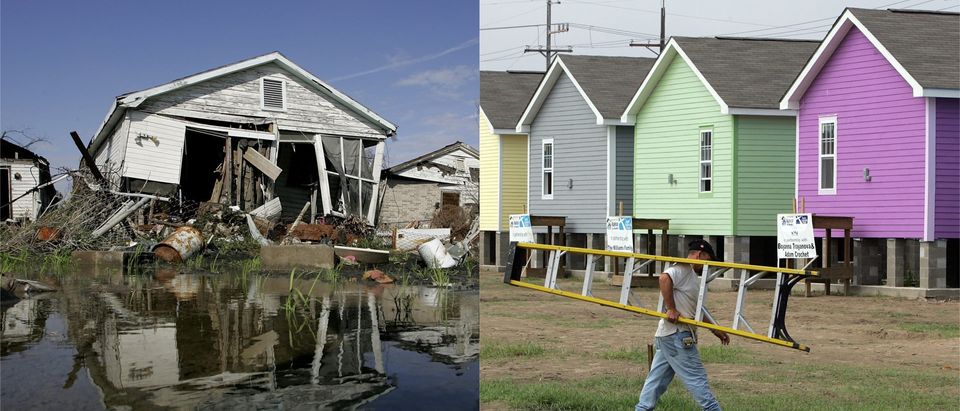It’s Apprenticeship Week — a time to celebrate the history and leadership of the skilled trades in developing and refining apprenticeships in America and providing businesses with the tools to train our next-generation workforce.
There’s never been a greater time to pursue a career in construction, particularly when student debt has reached $1.5 trillion and the average graduate amasses nearly $40,000 in college loans before even starting his or her career. That’s a real tragedy when you consider that the construction industry currently needs to hire more than 500,000 workers and offers rewarding careers with upward mobility for people willing to work hard.
I know this firsthand from my own career; I took advantage of an ecosystem of opportunities to learn on the job and pursue my dreams. If I had been told 40 years ago that my job would one day lead me to the White House to meet the President of the United States, I would’ve laughed.
But that was my reality several months ago when I found myself standing alongside industry leaders from around the country to make a pledge to help grow the nation’s skilled workforce. For me, it was the top of a ladder I’ve been climbing for four decades, and just one example of the opportunities available to anyone interested in a career in construction.
My career path started with a $9-per-hour construction job in a paper mill right after high school. I found the work at my first construction job satisfying, but more importantly, I saw the growth potential. Although I had never aspired to go to college, it wasn’t long before I began my journey of lifelong learning.
Through on-the-job, earn-while-you-learn education, I acquired basic office skills and then worked in a warehouse, where I eventually became a foreman. From there, I traveled from project site to site, working on various construction jobs and earning more money each time, all while learning the fundamental building blocks of the industry that I would later pass on to others.
I became a salaried employee with a large contractor based in Birmingham, Alabama, and traveled around the country for years working in a variety of industry roles on my way up the management ranks.
My career hit a significant turning point when I was contacted about an opportunity in a new division in our company focused on professional development and education. It was a good fit for me to apply the many skills that were threaded through my career, including the proper way to use tools, blueprint reading, construction math, supervisory skills, accounting, payroll, cost, procurement, logistics and more.
Once again, I became the apprentice, learning and mastering new competencies such as presentation skills, adult education theory and classroom management. In time, I was teaching courses and developing curricula for employees from front-line apprentices to senior leaders in our organization who were following their own career paths—not unlike my own.
The skills I had learned up to this point were put to the ultimate test when I was dispatched to be a logistics manager in the aftermath of Hurricane Katrina. There was nothing more humbling than being a point person helping to rebuild lives and infrastructure from scratch.
Upon returning to the home office, I was soon tapped to lead our craft apprenticeship program and work on special projects assigned by the company founder.
One such assignment allowed me to work closely with Associated Builders and Contractors (ABC) on its National Craft Championships, and eventually walk through a door of opportunity at ABC, a national construction trade association dedicated to free and open competition, safety, workforce development and helping its members succeed.
Today, I am vice president of health, safety, environment and workforce development at ABC, where I create and promote programs and opportunities for all Americans from all backgrounds to develop their abilities and achieve their dreams in the construction industry through apprenticeships, work-based learning and continuing education programs. We champion on-the-job instruction and re-skilling programs that allow workers to obtain stackable and portable credentials recognized at any job site in the country.
It’s in my role today that I was invited to the White House to make a pledge on behalf of our industry to attract and upskill a half-million workers during the next five years. It was the pinnacle of a long journey, and I am very grateful for the career path that the construction industry has afforded me.
That same door is open to anyone seeking a fulfilling career: women, minorities, veterans, students, non-graduates and people seeking new careers, re-entry to the workforce or a second chance at achieving the America dream. It’s been said that the construction industry is one of the best-kept secrets when it comes to career choices.
ABC offers more than 300 apprenticeship programs across 20 different occupations registered with the U.S. Bureau of Labor. ABC members annually invest $1.1 billion in workforce development.
In addition to government-approved apprenticeships, our all-of-the-above approach to workforce development has produced a network of ABC chapter and affiliated training centers in 1,400 locations across the country that offer more than 800 apprenticeship, craft, safety and management education programs.
From their early inception in the Middle Ages through today, apprenticeships have come far in building the people who build America. I’m proud to be part of that history and the future of work-based learning, opening limitless opportunities for Americans.
Greg Sizemore is Vice President of Health, Safety, Environment and Workforce Development at the Associated Builders and Contractors in Washington, D.C.
The views and opinions expressed in this commentary are those of the author and do not reflect the official position of The Daily Caller.


